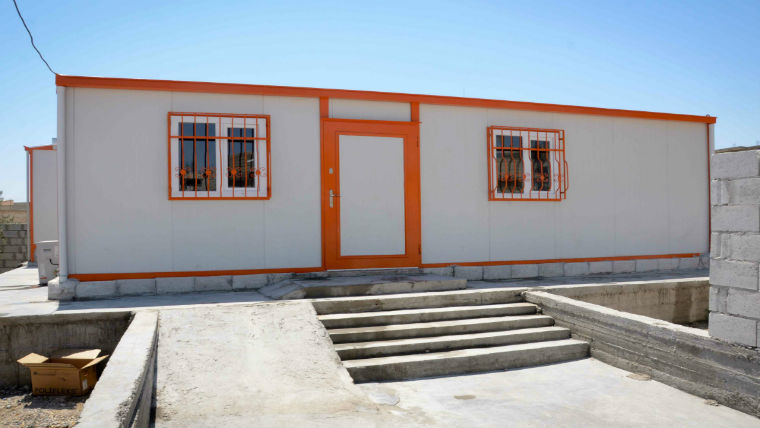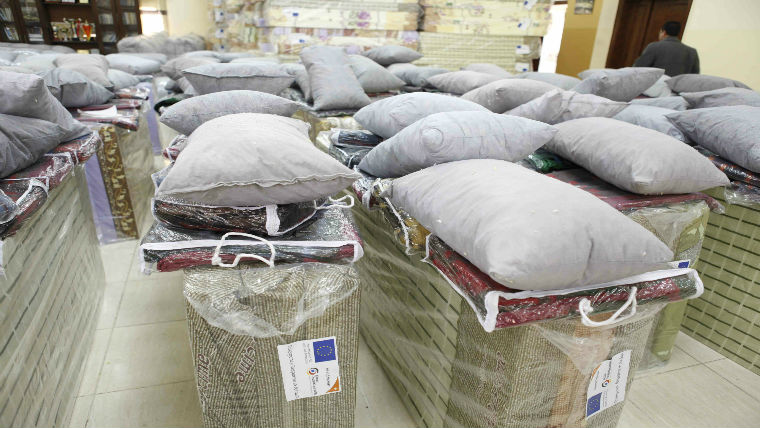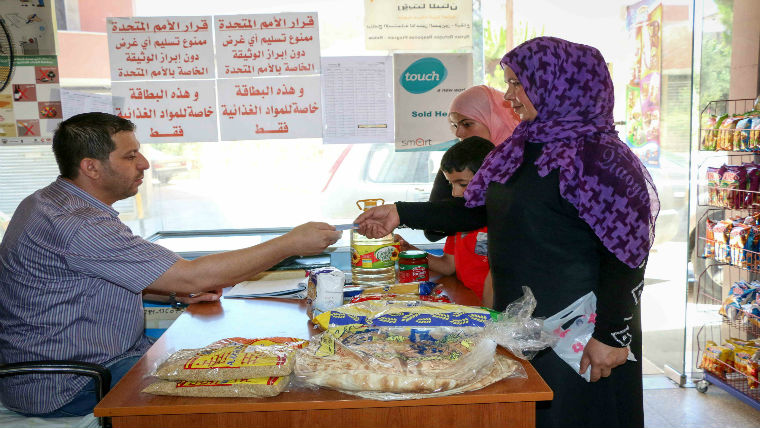Update: World Vision's Regional Syria Crisis Response
The conflict in Syria has now been going on for more than three years. More than 150,000 people have been killed, including more than 10,000 children. Six and a half million people have been displaced within Syria. Three million people have become refugees.
More than half of them are children.
Since 2011, World Vision’s regional response to the conflict in Syria and associated displacement has been steadily growing, and has now assisted up to 700,000 people. World Vision is responding in Lebanon, Jordan and Syria and is also now beginning operations in Iraq focusing on five areas:
- Clean water and sanitation: World Vision is helping in Lebanon and Jordan with projects to give refugees access to clean water and sanitation. Forced to flee from home, many Syrian refugees are living in informal tented settlements. World Vision is working tirelessly to ensure vulnerable Syrian refugees, as well as Jordanians and Lebanese living alongside them in the wider community, are accessing clean water and sanitation. Additionally, in the recently-opened Azraq camp, World Vision installed 2,000 latrines and shower spaces, thirty-nine tap stands, 156 taps, four water station, seven water tanks and 12.6km of piping. As well, in Syria, World Vision is delivering clean water. There are 70,000 people have benefited from a new pumping station while more than 200,000 have benefited from improved sanitation.
 Little boy drinking water from a World Vision water station from our WASH work
Little boy drinking water from a World Vision water station from our WASH work
©2014 World Vision, Simone Siddiqui
- Health care: From facilitating medical evaluations to simply assuring patients that their children will be okay, World Vision is helping out people across the region. In Syria, World Vision built health clinics to help internally displaced people and conducted more than 100,000 consultations. As well, in neighbouring countries in Jordan and Lebanon, World Vision is also providing medical support to hospitals, basic aid supplies, and health care assistance for Syrian refugees crossing the border
 World Vision’s health clinic serving internally displaced people in Syria ©2013 World Vision
World Vision’s health clinic serving internally displaced people in Syria ©2013 World Vision
- Clothing, Blankets and Hygiene Kits: Many Syrian refugees have been wearing the same set of clothing since they fled their homes. Aside from providing clothing, blankets and hygiene kits in Jordan, Lebanon and Syria, World Vision is also setting up its first operations in the Kurdistan Region in Iraq. Initial distributions of hygiene items, clothing and children and babies’ supplies are due to take place this week. More importantly, as winter is quickly approaching, World Vision is scheduled to bring in additional blankets, heating fuels, winter clothing to help prepare for the cold weather.
 A room full of blankets, pillows and bed provided by World Vision to help fight against the winter. ©2014 World Vision, Meg Sattler
A room full of blankets, pillows and bed provided by World Vision to help fight against the winter. ©2014 World Vision, Meg Sattler
- New Electronic Pre-Paid Card: World Vision has been working around the clock to provide food for people in Jordan, Lebanon and Syria. In Lebanon, for example, in partnership with the World Food Programme (WFP), World Vision has implemented an innovative way for families to obtain food called the electronic pre-paid card, also known as the “e-card”. Unlike the old system where families queued for hours to access limited basic food items like rice or wheat, with a voucher, this "e-card" allows them to purchase a greater range of food items with speed and convenience. More importantly, this new method enables refugees’ families the ability to access food with dignity. Instead of counting paper vouchers in front of other families and being instantly recognised as a “refugee”, the "e-card" provides a greater degree of anonymity and the ability for families to manage their budget accordingly.
 In Lebanon, every 5th of each month, families like Ibtisam and Sabah are able to buy basic food material through World Vision and the World Food Programme’s new electronic food assistance cards. ©2014 World Vision, Mona Daoud
In Lebanon, every 5th of each month, families like Ibtisam and Sabah are able to buy basic food material through World Vision and the World Food Programme’s new electronic food assistance cards. ©2014 World Vision, Mona Daoud
- Child friendly spaces: Since the crisis started, Syrian children have been bearing the brunt of the brutal conflict. Many are deeply traumatised and scared. World Vision’s child-friendly spaces are set up to provide stability for children in conflict settings. Trained counsellors and child protection staff are helping hundreds of children to regain a sense of normality through singing, drawing and verbal counselling. World Vision staff and volunteers are actively encouraging children to talk about their feelings in hopes of helping these young children heal from any trauma they have experienced.
 Children are singing and talking along in a music class at Zarqa Child Friendly Space, which exists to care for the needs of 200 of the most vulnerable Syrian refugee and Jordanian host children in Zarqa district ©2014 World Vision, Nigel Marsh
Children are singing and talking along in a music class at Zarqa Child Friendly Space, which exists to care for the needs of 200 of the most vulnerable Syrian refugee and Jordanian host children in Zarqa district ©2014 World Vision, Nigel Marsh
World Vision has spokespeople in Lebanon and Jordan available for interview. For media inquiries, please contact the media team at World Vision +44 (0)7889 631 613
World Vision joins DEC appeal to raise urgent funds for Indonesia tsunami survivors
The members of the DEC (Disaster Emergency Committee) launched the joint fundraising appeal today to raise vital funds for the survivors of the Indonesia earthquake and tsunami.
Indonesia earthquake and tsunami: World Vision UK launches appeal
World Vision UK has launched an emergency appeal to help people suffering in the aftermath of the Indonesian earthquake and tsunami.
Indonesia earthquake and tsunami: Recovery may take more than 2 years
World Vision experts say it will take years for communities in and around the Indonesian city of Palu to recover.
Indonesia earthquake and tsunami: World Vision response teams arrive in Palu
World Vision emergency response teams have arrived in Palu, to urgently support rescue workers searching for survivors two days after a powerful earthquake hit Indonesia and triggered a tsunami.